Ayurveda
Best Ayurvedic Treatment for Autism in Kochi| Kerala | India
Ayurveda is the famous traditional system of medicine practised in India thousands of years ago. The word implies the science of life in Sanskrit. It has many classic texts elaborated on the ways to maintain health and cure the disease. It is a treasure of knowledge with a detailed description of numerous diseases and their treatment. We are Best Hospital for autism in kochi .Ayurveda mentions the definition of health not as mere absence of disease but physical, mental and emotional well being with social harmony. Regular cleansing of body and mind is needed to maintain a clean body and a clear mind. Ayurveda suggests an ideal daily routine & seasonal regimen for all healthy individuals as part of maintaining health, thus preventing diseases. Jeevaniyam is Best Ayurvedic Treatment for Autism in Kochi ,Kerala , India . .
Ayurveda has eight specialities in which Kaumarabhritya deals with modern paediatric conditions. Ayurveda strongly believes that hereditary and genetic factors can cause disease with or without environmental support. Many instructions are given to coupe who wishes to have a baby. Antenatal and post-natal care are also elaborated with given importance to the health of both mother & baby, and prevention of any infections .
Neuro-degenerative disorders are considered as the clinical manifestation of an angry Vaata dosha, one among the mighty tridoshas or basic functional units in most cases. Though it is stated that controlling Vaata is a difficult task, many medicines & therapies are there to be done in such cases. Ayurveda can give wonderful results in differentially abled children when united with supportive & integrated therapies. Proper diet, lifestyle modifications and organic herbal formulations can help the child’s body systems function in a better way. Jeevaniyam Provides Best Ayurvedic Treatment for Autism in Kochi Kerala ,India .
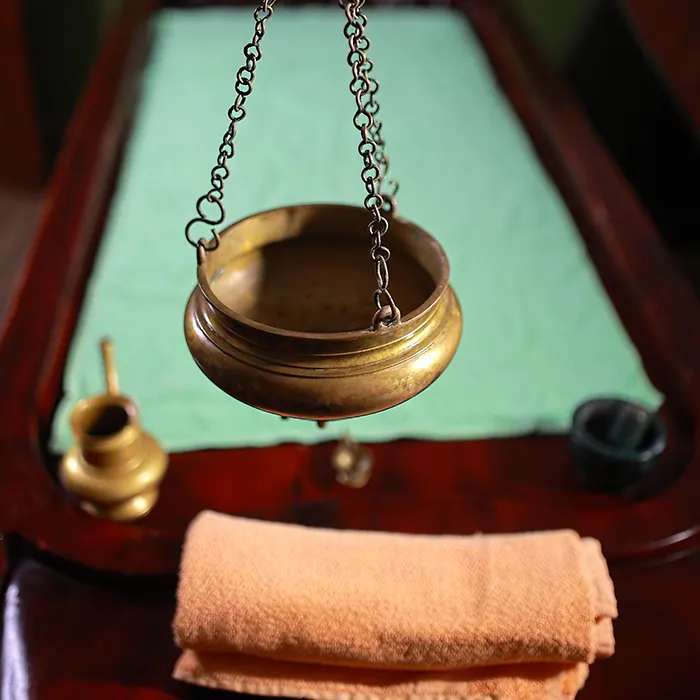
Ayurveda Treatment Procedures
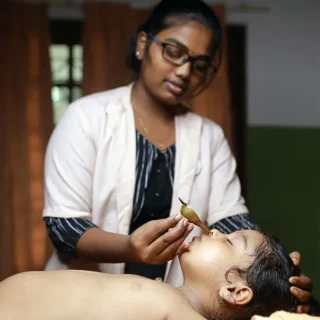
Nasayam
This is the administration of medicated ghee, oil, or decoction through the nostrils.
- Benefits: stimulates smell and taste, improves vision, cures sleep disorders, improves speech production, helps in clarity of mind and thought, reduces complaints like upper respiratory tract infection, recurrent rhinitis, allergies etc.
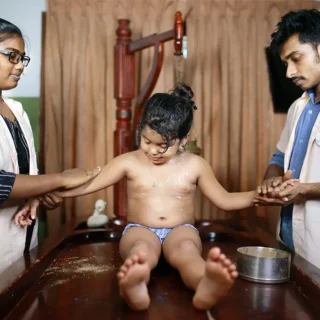
Udwarthanam
This is powder massage on the body with dried roasted and powdered herbs in a rhythmic pattern.
- Benefits: helps better tactile integration, acts as a detoxification procedure, corrects metabolism and blood flow, improves the mobility of the joints.

Thalapothichil
In this procedure, specific medicinal herbs are made into a paste in buttermilk and applied over the scalp and then the scalp is wrapped with banana leaves and cloth.
- Benefits: highly beneficial in neurotic disorders. Helps improve sleep, attention and memory. Reduces irritability, restlessness and tantrums. Jeevaniyam is Best Ayurvedic Treatment for Autism in Kochi , Kerala , India .
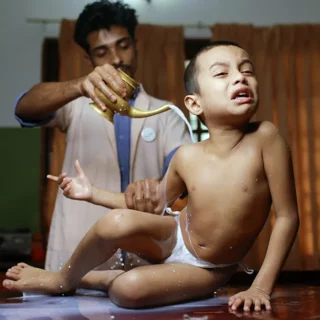
Ksheeradara
In this therapy, medicated milk is poured over the body and head for a stipulated time in a rhythmic pattern.
- Benefits: Reduces hyperactivity and stress, corrects sleep pattern, enhances the digestive process and prevents indigestion, improves the clarity of thoughts, regulates energy (Ojas) etc.
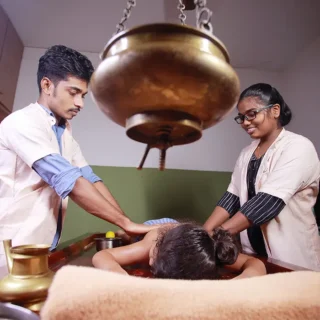
Abyangam
“Ayurveda autism treatment Talam involves the application of a herbal powder mixed with medicated oil on the vertex of the child’s scalp. This therapy is known to provide several therapeutic benefits for children with autism, such as promoting relaxation, improving and enhancing overall well-being.
- Benefits: improves proper circulation, gives better physical strength, improves vision, regulates sleep pattern. It is used to improve overall health.
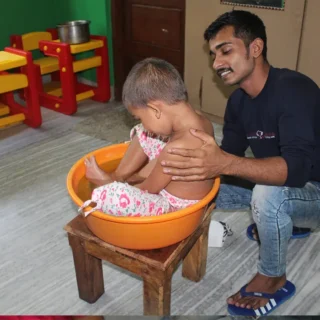
Avagaham
It is done by immersing the body in medicated decoction or oil to relax the whole body.
- Benefits: good for sensory integration, relieves constipation and urinary infection, good for relaxation.

Dhoopanam
Ayurveda autism treatment Dhoopanam is a therapy that involves fumigating the bedroom with medicated powder before sleep, which provides several benefits such as sensory stimulation, inducing sleep, and acting as a disinfectan
- Benefits: good for sensory stimulation, induces sleep, acts as a disinfectant.
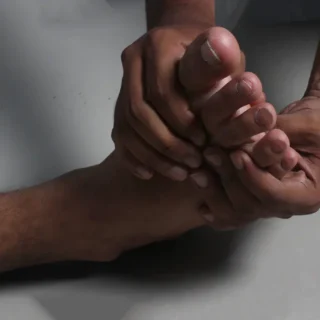
Paadaa abyangam
Ayurveda autism treatment Paada abyangam is a therapy that involves a foot massage, which is known to provide various benefits for children with autism.
Benefits: improves sleep patterns. Reduces irritability and stress.
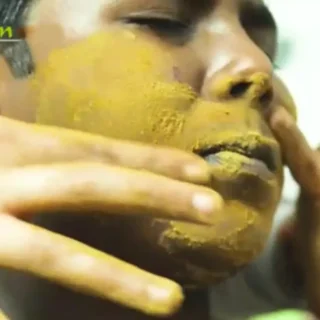
Mukhaabhyangam or Orofacial massage
Ayurveda autism treatment Mukhaabhyangam or Orofacial massage is a therapy that involves special massages over the cheeks, gums, and tongue with Ayurvedic medicines. This therapy is to provide several benefits for children with autism.
Benefits: helps in speech stimulation, corrects oral sensory issues, improves the strength of facial muscles.
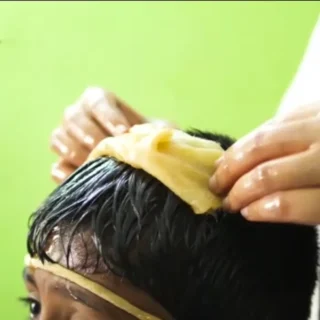
Siro Pichu
Ayurveda autism treatment Siro Pichu involves placing a cotton swab dipped in medicated oil on the vertex of the child’s scalp after a head massage. This therapy is to provide several therapeutic benefits for children with autism.
Benefits: Improves sleep pattern and concentration. Reduces irritability and stress. Relaxes the body and mind.
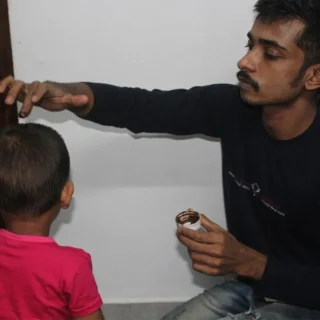
Talam
Ayurveda autism treatment Talam involves the application of a herbal powder mixed with medicated oil on the vertex of the child’s scalp. This therapy is known to provide several therapeutic benefits for children with autism, such as promoting relaxation, improving and enhancing overall well-being.
- Benefits: Reduces anger and irritability. Reduces recurrent respiratory infections and improves sleep patterns.
Jeevaniyam, Autism Treatment In Kerala
ALL THE WAY
ONWARDS
Our team remains committed to what we do. Our unique skill set combined with our understanding helps is guide your child the proper way.
PROFESSIONALS
We’ve handpicked the best specialists across India to entrust them with your child to tender to his requirements.
AWARDS
we’ve achieved more than what we’ve received. We always take the right choice step by step to make sure we make no mistakes.
SATISFIED CLIENTS
Our clients always choose us by the way we perform and providing the best for you and your child. our dedication and promise won’t compromise on any services and provide your child full support.
